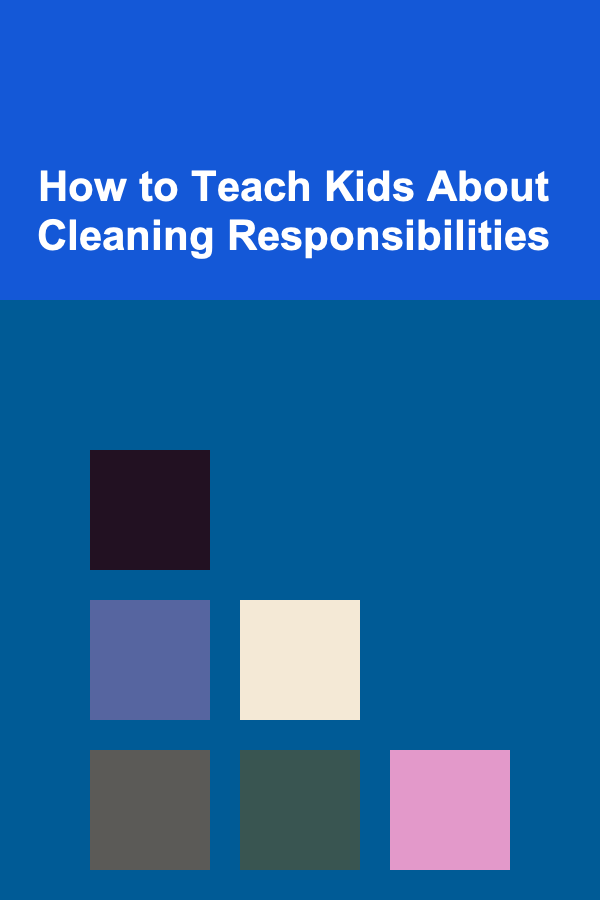
How to Teach Kids About Cleaning Responsibilities
ebook include PDF & Audio bundle (Micro Guide)
$12.99$6.99
Limited Time Offer! Order within the next:

Teaching children about cleaning responsibilities is an essential part of their development. Not only does it foster a sense of accountability and independence, but it also contributes to the establishment of a clean and organized home environment. In a world where life often feels chaotic, instilling good cleaning habits in children can help them manage their space effectively as they grow. This comprehensive guide explores methods, strategies, and best practices for teaching kids about cleaning responsibilities.
Understanding the Importance of Teaching Cleaning Responsibilities
1. Building Life Skills
Cleaning is a fundamental life skill that everyone needs. By teaching kids how to clean, you equip them with the tools necessary for maintaining their own living spaces in the future, whether as teenagers or adults.
2. Encouraging Responsibility
When children are given specific cleaning tasks, they learn to take ownership of their actions and the environments they inhabit. This sense of responsibility helps build their confidence and self-esteem.
3. Instilling Habits
Developing good cleaning habits early on makes it more likely that these practices will carry into adulthood. Children who learn to clean regularly are more likely to continue those routines as they grow older.
4. Promoting Teamwork
Cleaning as a family fosters teamwork and cooperation. When kids work alongside parents or siblings, they learn how to communicate effectively and contribute to a common goal.
Preparing to Teach Cleaning Responsibilities
Before you begin teaching your children about cleaning, consider the following steps to set the stage for success.
1. Assess Their Age and Capabilities
Different age groups have varying levels of understanding and physical ability. Tailor your expectations and tasks based on what is appropriate for your child's age:
- Toddlers (2-4 years): Simple tasks like picking up toys or wiping spills with a damp cloth.
- Preschoolers (4-5 years): Sorting laundry or dusting low furniture.
- School-age children (6-12 years): More complex tasks such as making their beds, sweeping, or helping with dishwashing.
- Teens (13+ years): Full responsibility for their room, managing laundry, and contributing to household chores.
2. Create a Positive Environment
A positive approach to cleaning encourages children to participate willingly. Avoid using punitive language and instead focus on the benefits of cleanliness---like a tidy play area or a fresh-smelling kitchen.
3. Set Clear Expectations
Discuss the importance of cleaning and outline what cleaning responsibilities entail. Having clear, tangible goals sets the foundation for successful learning.
Strategies for Teaching Kids About Cleaning Responsibilities
Once you're prepared, it's time to implement effective strategies for teaching cleaning responsibilities.
1. Make It Fun
Creating a fun atmosphere around cleaning can make it feel less like a chore. Here are some ideas:
a. Gamify Cleaning
Turn cleaning tasks into games. For example, use a timer and see who can pick up the most toys in five minutes or create a scavenger hunt where kids search for items they need to put away.
b. Create a Reward System
Establish a chart where children can earn stickers or points for completing cleaning tasks. You can provide rewards once they accumulate a certain number of points.
c. Use Music
Play upbeat music while cleaning to create a lively atmosphere. Dancing while cleaning can make the experience enjoyable.
2. Lead by Example
Kids often emulate the behavior of their parents. Demonstrate good cleaning habits by showing them how you clean. Explain your process and why each step is important.
3. Provide Step-by-Step Instructions
When introducing a new cleaning task, break it down into manageable steps. Here's a simple way to do this:
a. Choose a Task
Select a task, like cleaning their bedroom.
b. Demonstrate
Show them how to do it first. For instance, demonstrate how to make a bed by stripping it down, washing the sheets, and putting the pillows back in place.
c. Supervise
Let them attempt the task while you supervise, providing guidance and encouragement.
d. Give Feedback
After they complete the task, offer constructive feedback. Point out what they did well and any areas for improvement in a positive manner.
4. Assign Age-Appropriate Tasks
Assign tasks that match their age and abilities. Some examples include:
- Toddlers: Picking up toys, wiping surfaces with a damp cloth.
- Preschoolers: Dusting furniture, helping to sort laundry, watering plants.
- School-Age Children: Vacuuming, washing dishes, taking out the trash.
- Teens: Managing personal laundry, cleaning bathrooms, cooking simple meals.
5. Establish Routines
Incorporate cleaning responsibilities into their daily or weekly routines. Consistency helps children understand when they are expected to clean and reduces resistance over time.
a. Daily Checklists
Create a morning or evening checklist that outlines daily cleaning tasks. This could include making their bed, putting away clothes, or tidying up play areas.
b. Weekly Responsibilities
Assign specific weekly tasks, such as vacuuming or emptying the dishwasher. Rotate these tasks among family members to keep things fresh.
Encouraging Independence
Fostering independence is crucial in helping your children develop confidence in their cleaning abilities.
1. Allow Choices
Encourage children to choose which tasks they want to complete. Providing options empowers them and helps them feel in control of their responsibilities.
2. Gradually Increase Responsibility
As children become more proficient at cleaning, gradually increase the complexity and frequency of tasks. This builds their confidence and skills.
3. Trust Their Judgment
Allow children to take the lead when it comes to their spaces. Encourage them to decide how they want to organize their rooms or which cleaning methods they prefer.
Overcoming Challenges
Teaching kids about cleaning responsibilities may come with its share of challenges. Here are some strategies to navigate these hurdles:
1. Address Resistance
Children might resist cleaning due to boredom or inconvenience. Combat this by re-emphasizing the benefits of cleanliness and reminding them of the fun aspects of cleaning.
2. Adjust Expectations
Understand that perfection should not be the goal. Focus on effort rather than the final result. A messy room cleaned up a little is better than a perfectly clean room that never gets touched.
3. Be Patient
Learning takes time, so remain patient as children grasp the cleaning processes. Offer support and reassurance along the way.
Creating a Cleaning Culture
Building a cleaning culture in your home goes beyond individual tasks and responsibilities. Consider the broader implications of fostering a cleaning mindset.
1. Teamwork
Emphasize that cleaning is a shared responsibility. Make family cleaning days where everyone participates, promoting unity and cooperation.
2. Celebrate Successes
Recognize and celebrate achievements---big or small. This could be as simple as praise for a job well done or planning a special treat after a successful cleaning day.
3. Encourage Lifelong Habits
Reinforce the idea that cleanliness is a lifelong habit. Share stories about how maintaining a clean environment can lead to greater overall well-being and success.
Conclusion
Teaching kids about cleaning responsibilities is an invaluable investment in their growth and development. By instilling cleaning habits, you prepare them for independent living while fostering responsibility and teamwork. The key lies in making the process engaging, setting clear expectations, and providing supportive guidance.
By cultivating a cleaning culture within your home, you empower children to embrace their responsibilities confidently. As they grow, the lessons learned will serve them well beyond childhood, contributing to healthier lifestyles and more organized lives. Embrace the journey of teaching cleaning responsibilities; it's a rewarding endeavor for both you and your children!
Reading More From Our Other Websites
- [Home Pet Care 101] How to Build a Safe Space for Your Pet During Fireworks or Storms
- [Rock Climbing Tip 101] Common Quickdraw Mistakes and How to Avoid Them
- [Personal Investment 101] How to Generate Passive Income by Offering Freelance Deep Learning Services
- [Organization Tip 101] The Benefits of Using Professional-Grade Grout Cleaning Tools
- [Star Gazing Tip 101] Star Charts in Culture: How Different Civilizations Charted the Heavens
- [Home Budget Decorating 101] How to Use Wall Art to Enhance Your Home's Decor on a Budget
- [Organization Tip 101] How to Engage Kids in Learning About Wellness Practices
- [Organization Tip 101] How to Create a Home Inventory for Easy Tracking
- [Home Security 101] How to Make Your Home Less Vulnerable to Cyber Hackers
- [Sewing Tip 101] Choosing the Perfect Button: Materials, Sizes, and Styles for Every Project

How to Optimize Your Spending Habits for Long-Term Financial Health
Read More
How to Set Up a Family Photography Challenge at Home
Read More
How to Style Your Dining Room with the Right Lighting
Read More
Mastering the Art of Quick & Healthy Sheet Pan Meals
Read More
Exploring Liquidity Pools in Decentralized Finance
Read More
10 Tips for Profitable Affiliate Marketing in the Pet Niche
Read MoreOther Products

How to Optimize Your Spending Habits for Long-Term Financial Health
Read More
How to Set Up a Family Photography Challenge at Home
Read More
How to Style Your Dining Room with the Right Lighting
Read More
Mastering the Art of Quick & Healthy Sheet Pan Meals
Read More
Exploring Liquidity Pools in Decentralized Finance
Read More